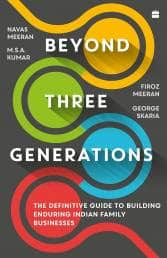



Over the last decade, a clutch of well-funded tech-driven entrepreneurs have hogged the limelight in India, more recently for all the wrong reasons. For each one of such stars, there are scores of lesser-known startups that have stayed out of the limelight but built successful enterprises by focusing on profitable growth even if it came at the expense of rapid scale.
Not surprisingly, most of them are family enterprises, a critical constituent of India’s business landscape. Significantly, while family businesses constitute about 75 per cent of the Indian economy a whopping 90 per cent of them are micro, small and medium enterprises (MSMEs). Together, they fuel the country’s economic engine contributing about 29 per cent of India’s GDP and accounting for a full 49 per cent of exports.

A new book titled Beyond Three Generations: The Definitive Guide to Building Enduring Indian Family Businesses (Harper Business) co-authored by Navas Meeran, MSA Kumar, Firoz Meeran and George Skaria, profiles a dozen such enterprises, focusing on their business dimensions including strategy, positioning and scaling along with the role of external advisors in facilitating their transformation and growth. The authors also take a careful look at what such firms should not do within the defined framework of the business family which is the unifying force for multigenerational businesses but equally also what Kavil Ramachandran, professor and senior advisor, Thomas Schmidheiny Centre for Family Enterprise, Indian School of Business, in his foreword to the book calls the “disruptor”.
The task of seeding a new business is hard and harder still is surviving those first couple of years. But equally difficult is the task of scaling up to achieve viability. It calls for a shift in mindset, radical changes in organizational structure and operating style, all the while keeping the original aspiration and ambition intact. This book is about the business heroes who have managed this delicate balance.
Some of them like Aravind Eye Care System, IBS Software and Sandu Pharmaceuticals are well known despite their small size. But it is their backstory, as well as that of others like Bhima Jewellers, Dodla Dairy and Eastern Condiments, that is truly revealing for the strategic choices they have made and the challenges they had to overcome en route.
To that extent, the authors have chosen a fine representative list that straddles sectors ranging from healthcare to hospitality and instrumentation to fashion. Their antecedents are equally diverse. While Sandu Pharmaceuticals has its roots in an Ayurvedic practice started way back in the 1800s others like IBS Software are first-gen enterprises. The smorgasbord of sectors and nature serves as an objective correlative for the melting pot that is Indian business.
 Dodla Dairy was the fourth business venture by a 23-year-old industrial engineer Sunil Dodla Reddy, in 1995, that met with eventual success after previous ventures failed.
Dodla Dairy was the fourth business venture by a 23-year-old industrial engineer Sunil Dodla Reddy, in 1995, that met with eventual success after previous ventures failed.The stories are also a tribute to the grit and fortitude of the men and women who have guided these enterprises from infancy to adulthood. Take Dodla Dairy, set up by a 23-year-old industrial engineer Sunil Dodla Reddy who started by exporting Indian mangoes to Singapore, a venture that met with limited success as did the next few businesses including growing mushrooms and garments. It was only his fourth venture, the dairy business he started in 1995 with a Rs 5 crore loan from IDBI Bank and some more from his father, that met with eventual success. Its turnover of Rs 2,800 crore as of March 2023, is a testimony to the entrepreneurial instincts and persistence of Reddy who swears by the kind of fiscal discipline unknown to a new generation of entrepreneurs fattened by the easy money of private equity.
While each of the companies has a unique and differentiated story, some common themes run through all of them as indeed they would through most successful enterprises of this nature. Thus, every family business reaches a make-or-break moment when transformation becomes imperative. The key to a successful transformation is carrying all the involved family members along and having an aspirational goal which may even sound utopian to start with much like Dr Venkataswami’s vision at Aravind was “to eliminate needless blindness”. As the book says: “Transformation of a family business is not about making a caterpillar crawl faster but about turning it into a butterfly.”
In the pursuit of such lofty goals, companies need to take balanced risks. IBS Software, for instance, which began operations in 2000 just after the Y2K millennium bug had given Indian software services providers their jumpstart, dared to buck the trend by developing software products for the travel and tourism industry. Its subsequent success owes much to that leap of faith.
The book concludes by compiling the 7Cs that drive business success: clarity, commitment, consistency, courage, cohesion, competency and compounding for scaling up. It could as well serve as a framework for businesses across the spectrum.
Discover the latest Business News, Sensex, and Nifty updates. Obtain Personal Finance insights, tax queries, and expert opinions on Moneycontrol or download the Moneycontrol App to stay updated!
Find the best of Al News in one place, specially curated for you every weekend.
Stay on top of the latest tech trends and biggest startup news.